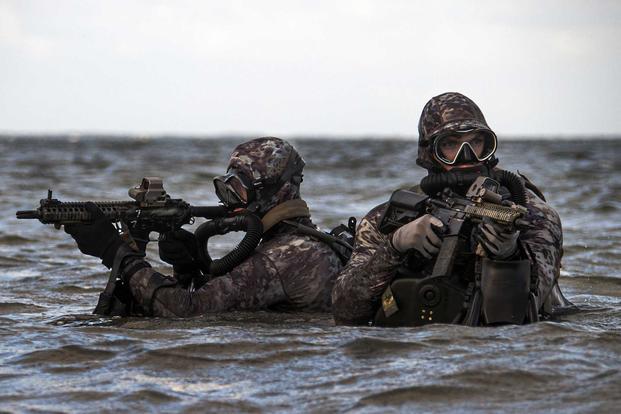How much do you need to prepare for a military fitness test? It depends on the job, rating, military occupational specialty or Air Force specialty code you want. Your athletic history and pre-military training habits will determine just how long each day you will need to train before joining.
Here is a question from an active-duty Navy petty officer seeking to move into the Navy diving community:
Stew, how many hours a week would you say your students are spending on your programs? What about including things like recovery and mobility work? I'm an active-duty Navy [sailor] trying to make sure I'm giving 100% as I prepare for the Dive community. Thanks, ST
ST, as with any program, your first focus is to remove any weakness you may have. The No. 1 factor that will determine your acceptance into the Dive Community is your performance on the Navy Diver Physical Screening Test (PST).
If you are not acing the PST, you may never get the opportunity to change rates and go to Dive School. The good news is PST-level training doesn't take a lot of time and, in as little as an hour per day, you can do workouts that focus specifically on running and swimming faster, along with high-repetition calisthenics. Obviously, this hour is on top of any physical activity in your normal workday.
The second weakness that many people have is a lack of water confidence. Swimming in general, treading water, underwater swimming and learning to breathe underwater using scuba gear is not easy. Getting in the water near every day will help you become more confident. Learn more about treading water and seriously practice it because most people consider it easy before trying it. Poor performance in treading is responsible for more failures than any other skill in diving school prep courses.
Recovery, Mobility and Flexibility Training Can Help with Treading, Too...
Of course, finding the time for this daily effort will require a well-thought-out recovery plan. Having a day or two in the week when you can focus solely on flexibility, mobility and pool skills like treading and drownproofing will go a long way in helping you recover from hard workouts as you learn valuable pool skills.
To answer your question, I recommend a midweek and end of week Mobility Day that looks like this:
Repeat 5 times
- Swim or other non-impact cardio: 5 minutes
- Stretch, foam roll or massage: 5 minutes
If you have more time, tread water for 5 to 10 minutes with no hands and follow up with some of the pool skills you will see at Dive Prep and Dive School like drownproofing and underwater swimming. Never do this training alone.
Here are more training ideas for pre-dive school.
After each daily workout, devote 15 to 20 minutes to these recovery, mobility and flexibility drills, and you will be in a better recovery position before or after a long day of work.
The overall amount of time devoted to training each day depends on your athletic history, current physical condition and future goals. If you are considering programs like diving and special ops, you will need to put in the time swimming on top of running, calisthenics and lifting weights. This may take 90 to 120 minutes a day.
If you are looking for a career as an Army Ranger or in Special Forces, the need for swimming is reduced to zero. You only need to ruck on your leg days (2 to 3 times a week), whereas swimming should be done daily if you are not a swimming athlete and need more water time.
If you are considering a conventional military profession, your athletic history may be enough with as little as 30 minutes of specific testing training each week to get through basic training and the follow-on military schools.
One thing is certain: There is no 30-minute gym workout that will prepare you for specialized training like Dive School or other special ops training, so putting in the time to overcome your weaknesses is the ultimate goal for your success. Don't forget that, as you work harder, the need for recovery days will be greater as well.
-- Stew Smith is a former Navy SEAL and fitness author certified as a Strength and Conditioning Specialist (CSCS) with the National Strength and Conditioning Association. Visit his Fitness eBook store if you're looking to start a workout program to create a healthy lifestyle. Send your fitness questions to stew@stewsmith.com.
Want to Learn More About Military Life?
Whether you're thinking of joining the military, looking for fitness and basic training tips, or keeping up with military life and benefits, Military.com has you covered. Subscribe to Military.com to have military news, updates and resources delivered directly to your inbox.


















